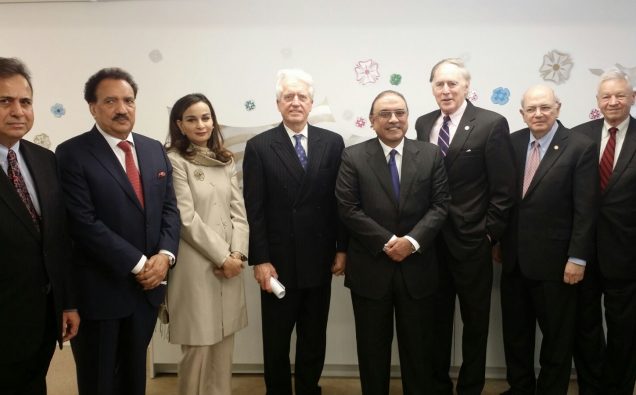
Arguing that the United States has a role to play toward South Asian peace, former president Asif Ali Zardari has asked President Donald Trump to have a special envoy to troubleshoot longstanding issues afflicting the region – something that Barack Obama missed.
He also called for giving time to the new US president to give shape to his policies and just dismiss him out of hand since he has come with a mandate of American votes.
“It’s too early,” Zardari said on the eve of Mr. Trump’s inauguration last week, according to The Washington Times, which ran a story based on an interview with the leader of Pakistan Peoples Party, one of Pakistan’s largest political parties. “Wait for the first 90 days at least, and then we see how the cookie crumbles, or talks and walks.”
On bolstering the US-Pakistan relationship – which suffered a spate of setbacks under Obama – Zardari said the U.S. president should breathe new life into the relationship by realizing that the wars against extremism in Afghanistan and Pakistan are the same as being fought against ISIS in the Middle East.
“We’re losing the battle of minds against extremists in Afghanistan, we’ve lost it in Pakistan, we’ve lost it in Syria, we’ve lost it in Yemen, we’ve lost it in Iraq, we’ve lost it Libya, we’ve lost it everywhere,” Zardari said according to the Times.
During his visit, Zardari has met US lawmakers and also attended a breakfast ceremony, where interfaith leaders recited prayers from holy books as part of the inaugural events of the new Donald Trump’s administration.
He said President Trump should appoint an envoy like Richard Holbrooke to deal with the region, where Pakistan-India rivalry over Kashmir has imperiled South Asian peace.
According to the newspaper, the former Pakistani president suggested that a good pick might be Anne W. Patterson, a career Foreign Service officer and a former ambassador to Pakistan and Egypt.
The American diplomat, he said, should help “executive level” dialogues that are more robust “than Obama had.”
“With the world being as it is, with the mindset of terrorism as the new war in the world,” he said, “the least [the U.S.] can do is sit down with us and have a long, drawn-out strategy, which we can work on together to fight this mindset.”
He also accused India of thwarting a resolution to the long-running UN-recognized Jammu and Kashmir and argued that Washington and other international powers have a responsibility to “nudge” New Delhi toward a deal.
On Afghanistan, Zardari regretted the lack of progress on peace talks involving international powers, the Afghan government and the Taliban.
The “warlords” who dominate the Taliban, he said, “don’t want to fight in an election; they don’t want to fight in a democratic way.”“Dialogue is the only democratic form of moving forward, but obviously it hasn’t succeeded in the last 10 years,” he said, according to the Times.












